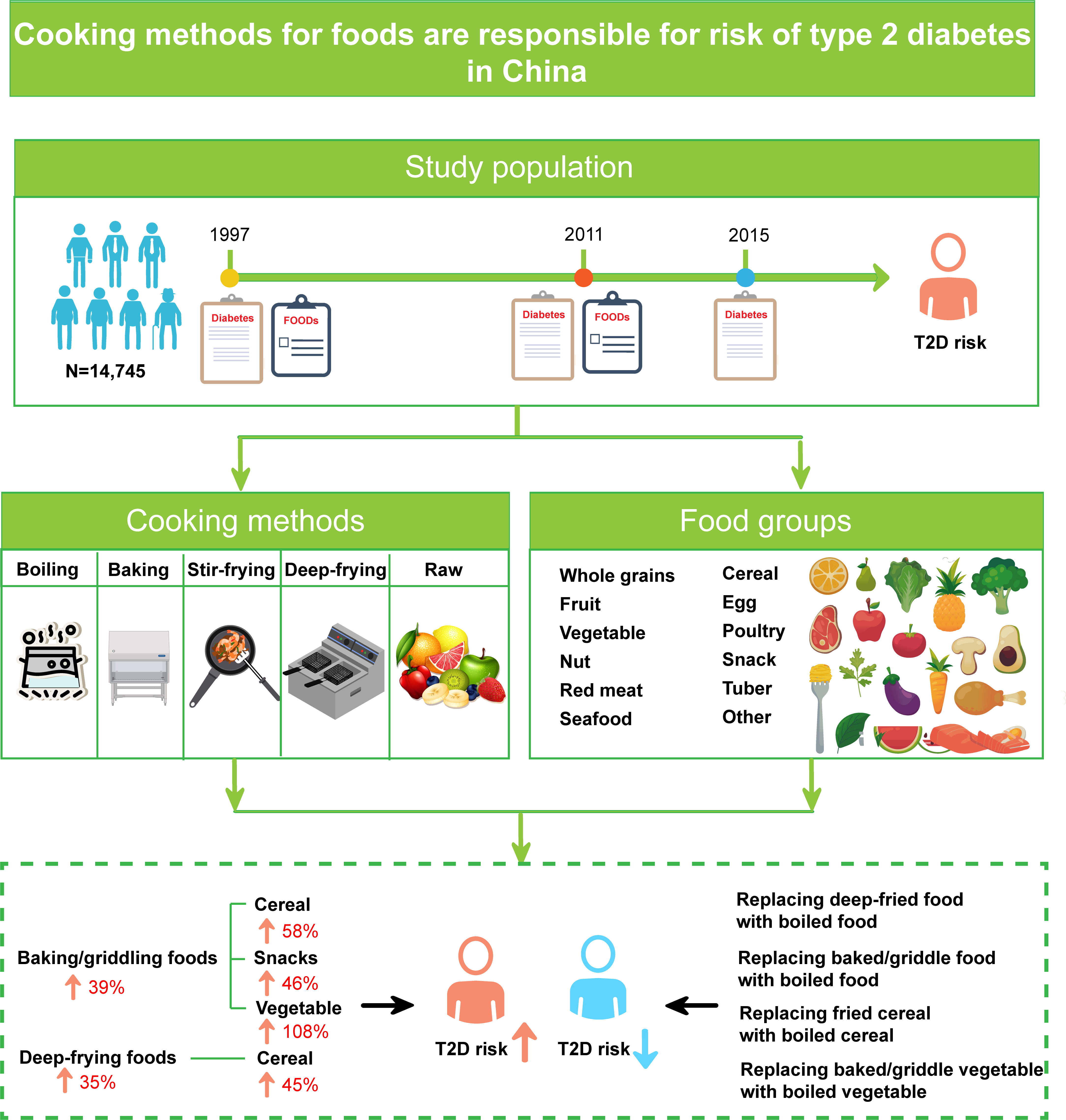Final ID: Mo3101
Associations between cooking method of food and type 2 diabetes risk: A prospective analysis focusing on cooking method transitioning
Abstract Body (Do not enter title and authors here): Background: Cooking process for food significantly impacts household air and increase exposure to endocrine disruptors such as acrylamide and, consequently, affecting human health. In the past 30 years, the transformation of cooking methods to high-temperature thermal processing has occurred widely in China.
Research Questions: Yet the transition of cooking methods on the onset of type 2 diabetes (T2D) remains unclear, which may hinder health-based Sustainable Development Goals.
Goals: We aimed to estimate the associations between dietary intake with different cooking methods and T2D risk.
Methods: We included 14,745 participants (>20 y) from the China Health and Nutrition Survey (1991–2015). Food consumption was calculated using three consecutive 24-h dietary recalls combined with both individual participant level and household food inventory. Cooking methods, including boiled, steamed, baked, griddled, stir-fried, deep-fried, and raw, were also recorded.
Results: The consumption of baked/griddle foods and deep-fried foods are positively associated with 39% and 35% higher of T2D risk by comparing the highest with the lowest categories of food consumption, respectively. The overall unhealthy cooking method for processing foods including baked/griddled and deep-fried foods was attributable for 15 million T2D cases of the total T2D burden in 2011, resulting in a medical cost of $2.7 billion and was expected to be attributable for 39 million T2D cases in 2030, producing a medical cost of $223.8 billion. Replacing one serving of deep-fried foods and baked/griddle foods with boiled/steamed foods was related to 50% and 20% lower risk of T2D, respectively.
Conclusion: Our findings support healthy driven cooking methods for daily diet are recommended to nourish sustainable T2D prevention in China.
Research Questions: Yet the transition of cooking methods on the onset of type 2 diabetes (T2D) remains unclear, which may hinder health-based Sustainable Development Goals.
Goals: We aimed to estimate the associations between dietary intake with different cooking methods and T2D risk.
Methods: We included 14,745 participants (>20 y) from the China Health and Nutrition Survey (1991–2015). Food consumption was calculated using three consecutive 24-h dietary recalls combined with both individual participant level and household food inventory. Cooking methods, including boiled, steamed, baked, griddled, stir-fried, deep-fried, and raw, were also recorded.
Results: The consumption of baked/griddle foods and deep-fried foods are positively associated with 39% and 35% higher of T2D risk by comparing the highest with the lowest categories of food consumption, respectively. The overall unhealthy cooking method for processing foods including baked/griddled and deep-fried foods was attributable for 15 million T2D cases of the total T2D burden in 2011, resulting in a medical cost of $2.7 billion and was expected to be attributable for 39 million T2D cases in 2030, producing a medical cost of $223.8 billion. Replacing one serving of deep-fried foods and baked/griddle foods with boiled/steamed foods was related to 50% and 20% lower risk of T2D, respectively.
Conclusion: Our findings support healthy driven cooking methods for daily diet are recommended to nourish sustainable T2D prevention in China.
More abstracts on this topic:
A Metabolomic Study of Cardiac Dysfunction in Hyperglycemia
Yoshida Yilin, Qi Qibin, Cheng Susan, Kaplan Robert, Rodriguez Carlos, Shah Amil, Yu Bing, Nguyen Ngoc Quynh, Moon Eun Hye, Casey Rebholz, Skali Hicham, Arthur Victoria, Echouffo Justin, Ballantyne Christie, Selvin Elizabeth
Cardiovascular and Respiratory Outcomes of Inspiratory Muscle Training in Pulmonary Hypertension Patients: A Systematic Review and Meta-AnalysisJavaid Hammad, Saddique Muhammad Nabeel, Mehmood Qasim, Tariq Shazia, Shahab Muhammad, Ali Aneika, Alam Shawail, Ali Sameel, Hakeem Luqman, Amjad Musfirah, Allah Bux Shahnaz, Hajizada Alisina

